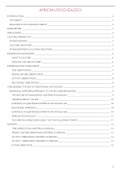AFRICAN PSYCHOLOGY
INTRODUCTION _____________________________________________________________________________ 2
THE DEBATE ______________________________________________________________________________ 3
ENGAGING IN AN ACADEMIC DEBATE ________________________________________________________ 3
EUROCENTRIC ______________________________________________________________________________ 3
AFROCENTRIC_______________________________________________________________________________ 4
CULTURAL PERSPECTIVE: ______________________________________________________________________ 5
ETHNOCENTRISM __________________________________________________________________________ 5
CULTURAL RELATIVISM _____________________________________________________________________ 5
ETHNOCENTRISM & CULTURAL RELATIVISM ____________________________________________________ 5
INDIGENOUS KNOWLEDGE ___________________________________________________________________ 6
WHAT IS CULTURE? ______________________________________________________________________ 6
HOW DO YOU SEE CULTURE? _____________________________________________________________ 6
INTERROGATING WORLDVIEWS _______________________________________________________________ 7
TIME ORIENTATION ______________________________________________________________________ 7
PEOPLE-NATURE ORIENTATION ____________________________________________________________ 7
ACTIVITY ORIENTATION __________________________________________________________________ 8
RELATIONAL ORIENTATION _______________________________________________________________ 8
CHALLENGING THE SELF IN TRADITIONAL PSYCHOLOGY __________________________________________ 9
INDIVIDUAL (WESTERN) APPROACH TO THE SELF AND BEHAVIOUR _______________________________ 9
THE NATURE OF KNOWLEDGE: WESTERN PSYCHOLOGY ______________________________________ 9
THINKING ABOUT THE SELF… ____________________________________________________________ 10
EXAMPLES OF QUESTIONS/COMMENTS WE WOULD ASK ______________________________________ 10
RELATIONAL APPROACH _________________________________________________________________ 10
EXAMPLES OF QUESTIONS/COMMENTS WE WOULD ASK ______________________________________ 10
AFRICAN PSYCHOLOGY? _________________________________________________________________ 11
THE AFRICAN WORLDVIEW IS BUILT ON THE FOLLOWING TENETS: ____________________________ 11
SUMMARY _________________________________________________________________________________ 13
TIME ORIENTATION WESTERN VS AFRICAN _________________________________________________ 13
PEOPLE- NATURE ORIENTAION WESTERN VS AFRICAN _______________________________________ 13
ACTIVITY ORIENTAION WESTERN VS AFRICAN ______________________________________________ 13
ACTIVITY ORIENTAION WESTERN VS AFRICAN ______________________________________________ 13
FUTURE DIRECTIONS ____________________________________________________________________ 15
1
, INTRODUCTION
There is such a diversity in the world that it is rather unfortunate that the discipline of
psychology has relied almost exclusively on theories and explanations developed in North
America in Europe to understand and help human beings.
▪ centuries of colonialism and cultural imperialism uh partly to blame
▪ this is because scientific ideas were valued they originated in the so-called first world, the
West and north, and ignored or undervalued if they originate in the East and South
As a result, the indigenous psychologies of Africa and Asia are largely absent from our
textbooks and classrooms, which still echoes the ideas of Freud, Pavlov, and Skinner
▪ however, long before these grandfathers of modern-day western psychology told us
about ourselves, the power of our thoughts, behaviour in feelings was well known by
tribal villages in Africa and others who had ancient elaborate theories of mind and
behaviour that have both philosophical and pragmatic purposes
An example of this is lucid dreaming - where you are aware you are dreaming it can control
what happens in your dream. This was dismissed as nonsense by Western psychologists until
LaBerge (1985) showed evidence of lucid dreaming through his experiments
Apartheid in South Africa allow this cultural imperialism to continue, and many psychologists
perpetuate it bad science, unethical practice, and ineffective assessment and treatment plans an
oppressed people these worldviews were completely different from the foreign theories of
personality, motivation, health, and illness developed in a foreign context
▪ to remedy this, a revival is currently taking place in psychological science where ancient
forms of knowledge are now being integrated into universities and practices
Some South African psychologists all writing about the value of African, eastern and are there
indigenous ways of seeing the world,
▪ we're beginning to learn from the hidden wisdom of sangomas, sayassis, monk, and
energy healers
This is part of development in the broad field of critical psychology, which tries to expose
ideological and cultural biases in knowledge, or cultural psychology that embraces more diverse
forms of knowledge, including the infusion of religious concepts
By understanding world use different from our own personal cultural lenses, we may appreciate
better the diversity, difference is an commonalities in South Africa's various groups of people.
2
, ▪ as suggested above, we need to develop a holistic psychology
▪ however, this cannot be developed in isolation from people's religious and cultural beliefs,
because these impacts on the views of themselves, others, the world, and the meaning of
health and illness, and how their problems ought to be properly solved
THE DEBATE
Can we & should we create an African Psychology?
Is African Psychology a myth or a reality?
Is psychology fundamentally western?
Is psychology relevant for Africans?
Should we approach psychology contextually in Africa or should we develop an African
Psychology?
What would the definition of an African Psychology be?
ENGAGING IN AN ACADEMIC DEBATE
▪ An academic debate does not involve opinion
▪ An academic debate needs to be grounded on principles
▪ We will be introduced to a few principles which can be used in a debate on African
Psychology.
Pre- eminent:
Surpassing all others
EUROCENTRIC
Thinking about all the theories covered so far and what was said, all the theories were derived
from the Western world, and they are assumed to be universal
- They are applicable to everyone in the world
However, all these theories do not take into account the views and perspectives of people
outside the Western world.
- These views are Eurocentric
- Only applicable to a certain group of people and did not take into account what other
cultures languages, philosophies say about the person and their behaviour.
‘Focusing on European culture or history to the exclusion of a wider view of the world;
implicitly regarding European cultures as pre-eminent.’ –
‘...reflecting a tendency to interpret the work in terms of European or Anglo-American values
and experiences.’
3




